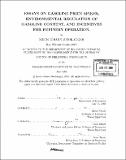Essays on gasoline price spikes, environmental regulation of gasoline content, and incentives for refinery operation
Author(s)
Muehlegger, Erich J
DownloadFull printable version (8.732Mb)
Other Contributors
Massachusetts Institute of Technology. Dept. of Economics.
Advisor
Glenn Ellison and Paul Joskow.
Terms of use
Metadata
Show full item recordAbstract
Since 1999, regional retail and wholesale gasoline markets in the United States have experienced significant price volatility, both intertemporally and across geographic markets. In particular, gasoline prices in California, Illinois and Wisconsin have spiked occasionally well above gasoline prices in nearby states. The three chapters of my thesis study the relationship between gasoline price spikes, environmental regulation of gasoline content, unanticipated refinery outages and other recent structural changes in the domestic oil market. In the first chapter, I detail current regulations related to gasoline content. Implemented regionally to address local mobile-source emissions, gasoline content regulations increase costs to refiners, transporters and distributors of gasoline, as well as reduce the fungibility of gasoline across different regions. Chapter one provides a summary of the regulations and a qualitative description the costs the regulations impose on refiners, transporters and distributors of gasoline. In chapter two, I estimate two distinct effects of gasoline content regulations in California, Illinois and Wisconsin: (i) the effect of increased production costs due to supplementary regulation, and (ii) the effect of incompatibility between these blends and gasoline meeting federal reformulated gasoline standards. Using a structural model based on the production optimization problem of refiners, I simulate wholesale prices for jet fuel, diesel and four blends of gasoline in each geographic market. I then specify a counterfactual in which gasoline in the three states met federal requirements. (cont.) Using a similar methodology, I also estimate the effect of two structural changes in the domestic oil market, (i) changes in refinery ownership and (ii) limited expansion of domestic refining capacity. I estimate the effect of increased refining costs is 4.5, 3.0 and 2.9 cents per gallon in California, Illinois and Wisconsin. The effect of incompatibility with federal RFG criteria, conditional on an in-state refinery outage, is 4.8, 6.6 and 7.1 cents per gallon in California, Illinois and Wisconsin. Controlling for the magnitude of local outages in these areas, I estimate that 72, 92 and 91 percent of price spikes created by local refinery outages could be mitigated by compatibility with federal RFG standards. In chapter three I study the challenge faced by regulators of differentiating strategic withholding of capacity from unreliable production. If a regulator cannot verify "unplanned" outages, the regulator cannot credibly distinguish between strategic behavior by producers and unlucky realizations of facility reliability. I specify a model in which a firm's choices of production and maintenance affect facility reliability and study how incentives arising from ownership of more than one facility affect facility reliability. I then statistically test whether the pattern of incidents is consistent with the predictions of the theoretical model. I find statistically significant evidence that ownership of other local refining capacity is correlated with the probability of an outage at a given refinery. In addition, the relationship between ownership and incident likelihood is greatest for markets with special gasoline formulations, where a refinery outage has the largest effect of gasoline prices. In these markets, expected incident likelihood is 30 percent greater for a refinery affiliated with another refinery that it is for an unaffiliated refinery.
Description
Thesis (Ph. D.)--Massachusetts Institute of Technology, Dept. of Economics, 2005. Includes bibliographical references (p. 145-153).
Date issued
2005Department
Massachusetts Institute of Technology. Department of EconomicsPublisher
Massachusetts Institute of Technology
Keywords
Economics.